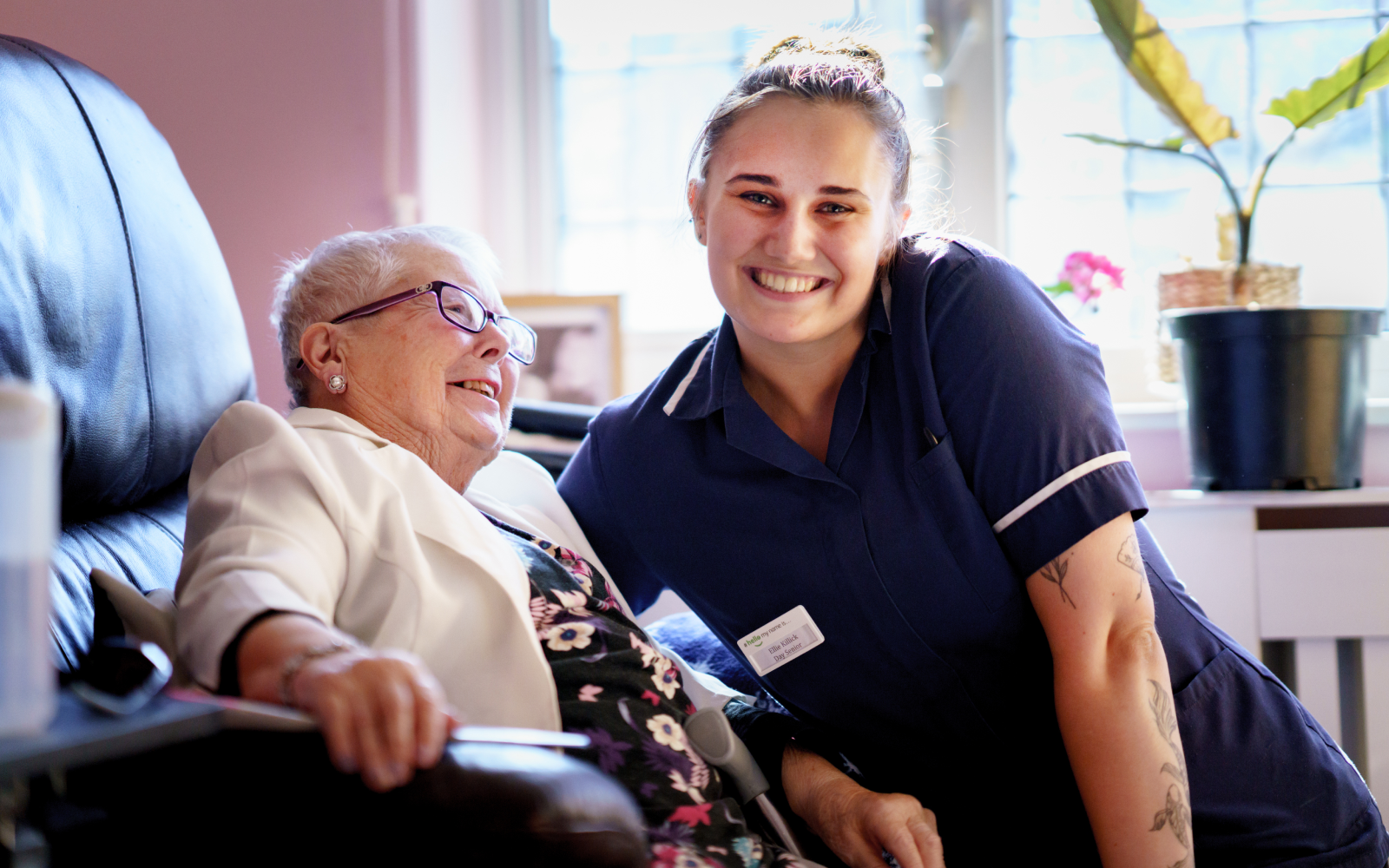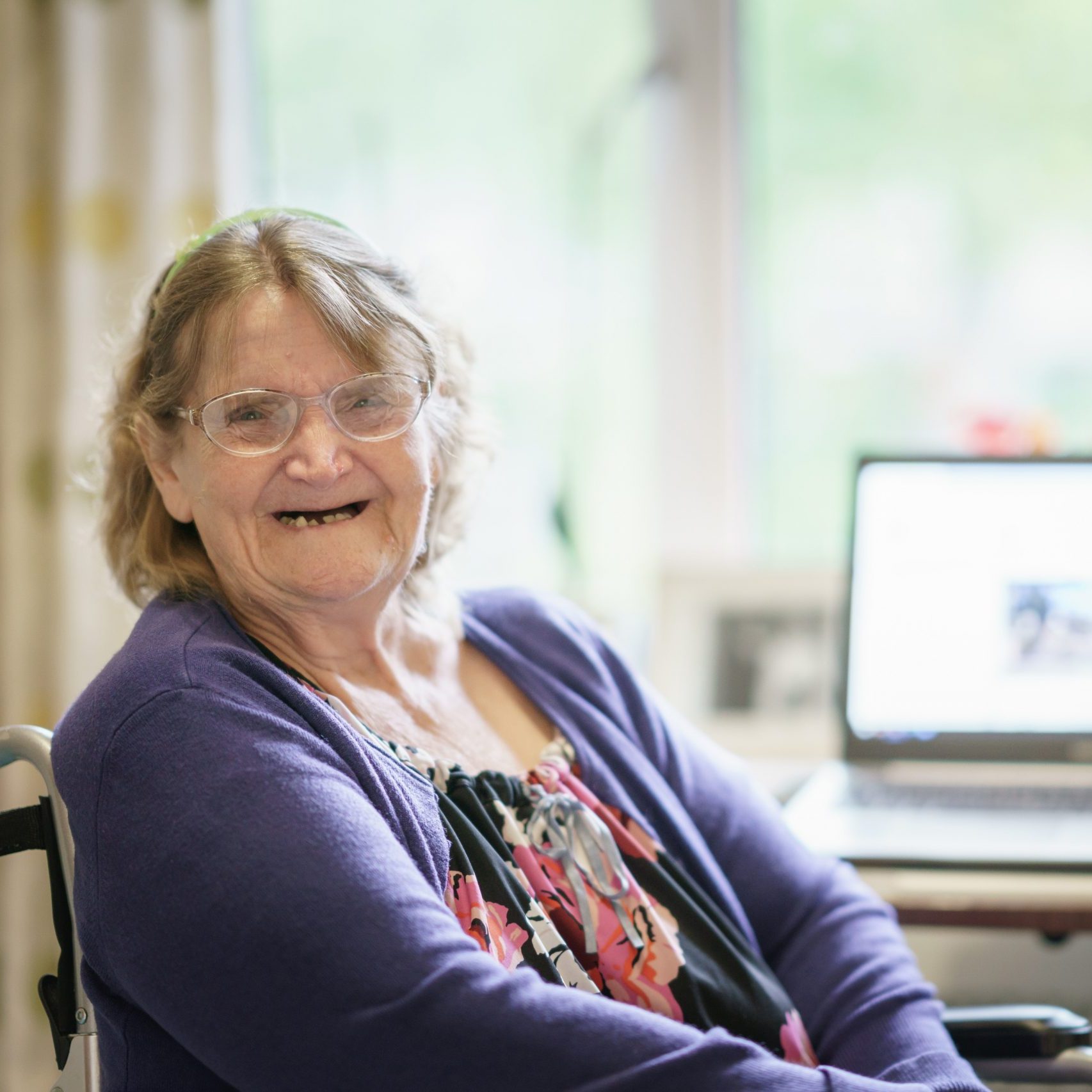
Research
My Home Life England was founded on evidence and research and this continues to be an important part of what we do.

Thriving in Residential Care
Are care homes a positive option for older people?
We’ve conducted one of the largest ever qualitative research studies on older people’s experiences of living in residential care, speaking to older people, families and care teams across the UK.
Our ‘Thriving in Residential Care’ research identifies some challenges, but reveals proportionally many more benefits of living in a care home.
It shines a light on six key ways that older people can thrive in a care home, if the conditions are right.

Virtual care delivery in domiciliary care
My Home Life England is the evaluation partner for Shropshire Council’s virtual care delivery project, funded by the Department of Health and Social Care.
The project aims to help meet people’s care and support needs digitally, and aims to promote quality of life and support independence.
The devices can be used for video calling, allowing a virtual care delivery team to chat to a person in their own home, find out how they are feeling, prompt them about daily tasks and assess whether the individual has everything they need.
We want to understand the lived experience of both those using the technology and the care providers delivering support.
Our Frameworks
We are informed by a robust evidence-base for quality in care services and our work is based around four frameworks:
In 2006 a group of academic researchers sat down with members of the care home sector and looked at the research that had been undertaken around care home practice, what matters to people living and working in care homes and what good practice looks. The evidence clustered around 8 best practice themes:
- Personalisation – how the care home supports people to feel seen, heard, involved and connected.
- Navigation – the great work care homes do to support people to navigate changes, including moving into the home, healthcare and end-of-life care.
- Transformation – the work leaders do to transform the culture of a home so that is promotes quality of life
Importantly, these themes have come directly from those in the care sector.
Reference – (NCHR&D Forum (2007) My Home Life: Quality of life in care homes – Literature review, London: Help the Aged. This review is being constantly updated).
It highlights the importance of not only meeting the needs of people who receive care, but also addressing the needs of relatives/friends and staff. It recognises that the quality of life of everyone involved in the care experience is crucial to improvements in practice. To achieve good relationships and quality of life for all, it suggests that we need to consider what gives each individual a sense of:
- Security (feeling safe)
- Belonging (feeling part of things)
- Continuity (making connections between past, present and future)
- Purpose (having goals)
- Achievement (moving towards their goals)
- Significance (mattering as a person)
Paying attention to these senses can help us identify the individual needs and personal outcomes for people who receive care, as well as their support circle and staff. At My Home Life England we use the Senses Framework to help make visible the contribution staff, support circles and people receiving care can make to the creation of a caring environment; we emphasise reciprocity and the need to create a care culture in which all participants are meaningfully involved.
Reference – Nolan, M., Brown, J., Davies, S., Nolan, J. and J. Keady. (2006). The Senses Framework: Improving care for older people through a relationship-centred approach. University of Sheffield. ISBN 1-902411-44-7.
The principles of Appreciative Inquiry include:
- What we believe to be true determines what we do
- How we talk influences how we and others act
- Storytelling is a key part of everyday life
- What we do today is guided by our image of the future
- Change is fostered through having positive relationships
At My Home Life England we have found that these principles are equally applicable, whether taking forward a large-scale development or working with individuals in the moment.
The notion of being ‘appreciative’ has sometimes been misunderstood as deflecting attention from difficulties or harsh realities. This is not the case. Instead it works with people’s values, respecting hidden stories of experience and personal narratives, demonstrating a sensitivity to feelings. As a process for supporting development, it can be transformational through establishing trust, authentic connection and a different quality of learning. The approach can be used to explore and develop a wide range of topics. The approach is also used to shape our everyday interventions and practice.
Reference – Reed, J (2007) Appreciative Inquiry. Research for Change, London: Sage
The Caring Conversations framework (Dewar & Nolan, 2013) enables this to happen by enhancing the way we engage with each other.
The framework suggests that, in order to deliver compassionate and dignified care, people need to:
- Be Courageous
- Celebrate
- Connect Emotionally
- Be Curious
- Collaborate
- Consider Other Perspectives
- Compromise
Within My Home Life England we have found that the framework helps to encourage and sustain genuine curiosity for ourselves and others, deepen inquiry, explore values, articulate tacit knowledge, and acknowledge and express emotion without dispute or judgement. It also supports a different attitude to risk-taking and devising new approaches to problems. Ultimately, it enables people to acknowledge achievements, encourage better listening and so make room for more contributions to enhance quality of life for all.
Reference – Dewar B and Nolan M (2013) Caring about caring: Developing a model to implement compassionate relationship centred care in an older people care setting, International Journal of Nursing Studies, 50(9):1247-58